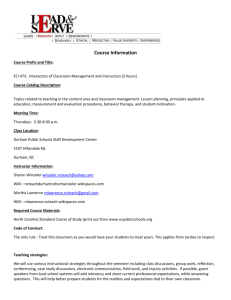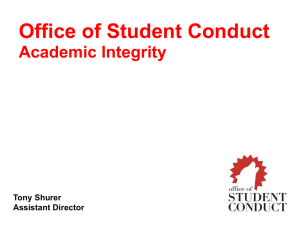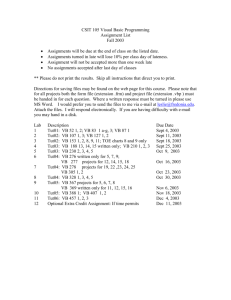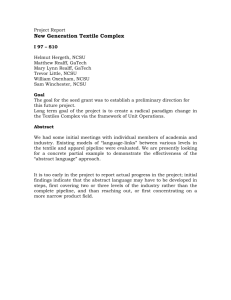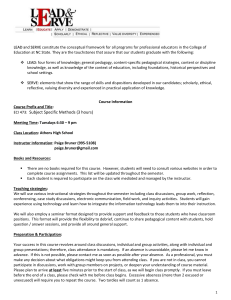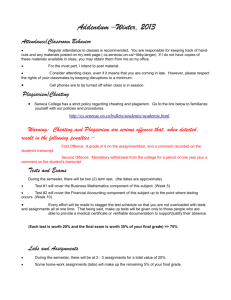DRAFT
advertisement
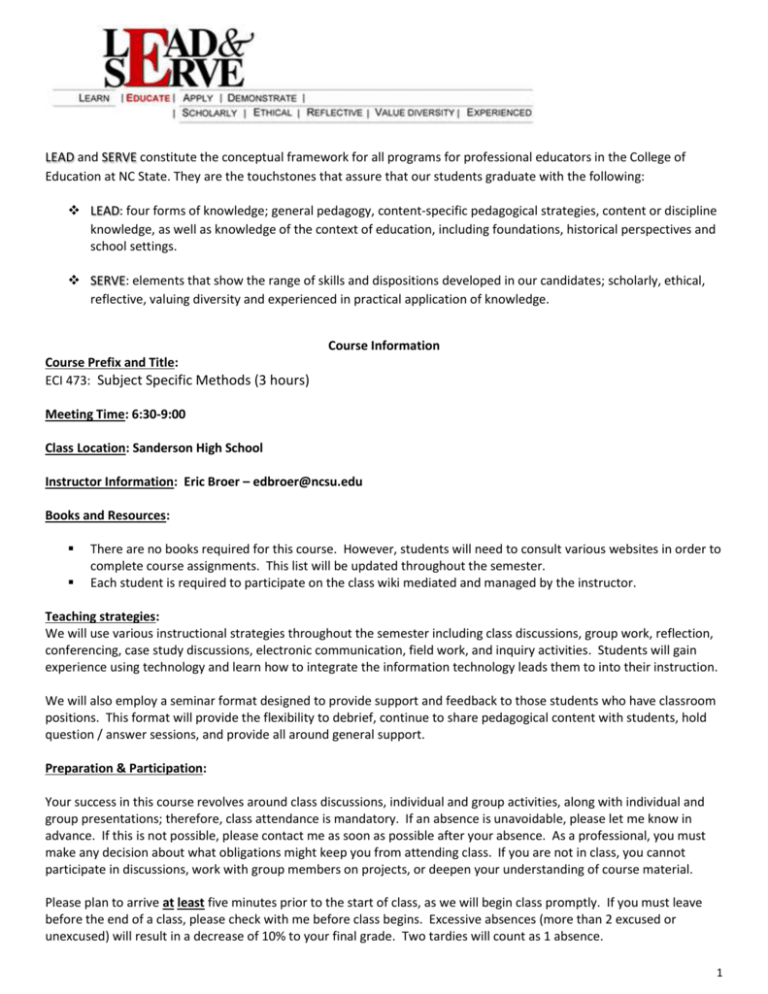
LEAD and SERVE constitute the conceptual framework for all programs for professional educators in the College of Education at NC State. They are the touchstones that assure that our students graduate with the following: LEAD: four forms of knowledge; general pedagogy, content-specific pedagogical strategies, content or discipline knowledge, as well as knowledge of the context of education, including foundations, historical perspectives and school settings. SERVE: elements that show the range of skills and dispositions developed in our candidates; scholarly, ethical, reflective, valuing diversity and experienced in practical application of knowledge. Course Information Course Prefix and Title: ECI 473: Subject Specific Methods (3 hours) Meeting Time: 6:30-9:00 Class Location: Sanderson High School Instructor Information: Eric Broer – edbroer@ncsu.edu Books and Resources: There are no books required for this course. However, students will need to consult various websites in order to complete course assignments. This list will be updated throughout the semester. Each student is required to participate on the class wiki mediated and managed by the instructor. Teaching strategies: We will use various instructional strategies throughout the semester including class discussions, group work, reflection, conferencing, case study discussions, electronic communication, field work, and inquiry activities. Students will gain experience using technology and learn how to integrate the information technology leads them to into their instruction. We will also employ a seminar format designed to provide support and feedback to those students who have classroom positions. This format will provide the flexibility to debrief, continue to share pedagogical content with students, hold question / answer sessions, and provide all around general support. Preparation & Participation: Your success in this course revolves around class discussions, individual and group activities, along with individual and group presentations; therefore, class attendance is mandatory. If an absence is unavoidable, please let me know in advance. If this is not possible, please contact me as soon as possible after your absence. As a professional, you must make any decision about what obligations might keep you from attending class. If you are not in class, you cannot participate in discussions, work with group members on projects, or deepen your understanding of course material. Please plan to arrive at least five minutes prior to the start of class, as we will begin class promptly. If you must leave before the end of a class, please check with me before class begins. Excessive absences (more than 2 excused or unexcused) will result in a decrease of 10% to your final grade. Two tardies will count as 1 absence. 1 Students are expected to be active and informed participants in the course. Active participation includes contributing to discussions on material presented and discussed in class. Students will remain open and respectful to the ideas of others. Grade Breakdown: 40% - Unit Plan (see attached assignment and rubric) 20% - Demonstration Lesson (1) 30% - Modules 10% - Daily Work and Participation (in-class and homework assignments) Evaluation of Assignments: A - Above and beyond / over the top in terms of responsibility and commitment to excellence. Attends all classes and displays professionalism in both attitude and example. Explores issues from all directions and models independent thinking in terms of application or utilization. Written work, where required, has no mechanical errors and is tied to facts and current educational philosophy. B - Goes a little beyond, while addressing all required criteria thoroughly. Attends class with few or no absences and consistently displays professionalism in both attitude and example. Explores issues and topics, but not in depth. Written work, where required, has few if any mechanical errors and is loosely tied to facts and current educational philosophy. C - Addresses all assignment criteria in an adequate way. Inconsistent with punctuality and class attendance. Demonstrates professional traits on occasion. Written work, where required, often lacks scholarship and needs extensive editing. D/F - Not acceptable and work will be returned for revision Grading: A+ = 98 – 100 A = 95 – 97 A- = 90 - 94 B+ = 87 – 89 B = 84 – 86 B- = 80 - 83 C+ = 77 – 79 C = 74 – 76 C- = 70 - 73 D+ = 67 – 69 D = 64 – 66 D- = 60 - 63 F = Below 60 Students with Disabilities See: http://www.ncsu.edu/provost/offices/affirm_action/dss/ Reasonable accommodations will be made for students with verifiable disabilities. In order to take advantage of available accommodations, students must register with Disability Services for Students at 1900 Student Health Center, Campus Box 7509, 515-7653. For more information on NC State's policy on working with students with disabilities, please see: http://www.ncsu.edu/provost/hat/current/appendix/appen_k.html Inclement Weather Policy: North Carolina State University rarely closes for inclement weather. You need to make your own determination about your comfort level and safety if driving during inclement weather. Use your own good judgment when determining whether roads are safe to navigate. If class is not canceled and you cannot attend, you will be responsible for making up what you miss. The primary information resources for students, employees, and the public regarding the campus's current open/closed status are the univeristy’s homepage (www.ncsu.edu) and the inclement weather hotline (919-513-8888). 2 Academic Integrity and Plagiarism The NCSU student code of conduct is available at: http://www.ncsu.edu/policies/student_services/student_discipline/POL11.35.1.php from Section 7: Academic Integrity 7.1 The free exchange of ideas depends on the participants' trust that they will be given credit for their work. Everyone in an academic community must be responsible for acknowledging their use of others' words, research results, and ideas, using the methods accepted by the appropriate academic disciplines. Since intellectual workers' words and ideas constitute a kind of property, plagiarism is like theft. 7.4 Plagiarism and cheating are attacks on the very foundation of academic life, and cannot be tolerated within universities. Regarding plagiarism and NCTEACH coursework: Students who submit lesson plans or teaching activities that are not their own must acknowledge the source and be clear about how much of the lesson plan/activity is from that source. For some assignments, LEAD Teachers will require students to develop a unique lesson plan or activity. For others, students may use and MODIFY online lesson plan resources. Please follow the specific instructions for the LEAD Teachers for each assignment. Students are responsible for maintaining transparency and academic integrity by acknowledging sources that are used (either “word-for-word” or paraphrased) and consulted. Doing so establishes trust between the NC TEACHer and the evaluator. The consequences for plagiarism are: 1- 1st offense: Failure of the assignment. This may lead to failure of the course, in which case an NC TEACHer would have to take the class again in order to continue the program. 2- 2nd offense: Ethics Review Board Hearing– The NC TEACHer would first go before an Ethics Panel of College of Education Faculty and could receive academic probation or dismissal from the program. 3 In Class Out of Class Aug 27 Syllabus, Expectations, & Grading for the semester Introductions/Ice Breaker Unit Plan and Demonstration Rubric Explanation Group Review Activity of the Lesson Plan structure Sign up for Demo Lesson Sign up for Cooperative Learning Presentation Choose Cooperative Learning activity and be prepared to present on 9/05 Sept 3 Unit Plan – Different From Summer 1. Pick unit Cooperative Learning Presentation 2. Direct Teaching Assignment – Due 9/12 Marzano chapters 2-3 / 6-8 / 10-12 CRISS – creating independent through studentowned strategies Sept 10 Critical Thinking Scaffolding Demos (2) assign Reading in Content Areas module DUE – Direct teaching assignment Work on Reading in Content Area Sept 17 NO CLASS -- Work on Reading in Content Areas Work on Reading In Content Areas Sept 24 Informal Assessments – Formative Assessments DUE: Reading in Content Area work Application of Questioning worksheet--Homework Oct 1 Multiple Choices Tests/EOC/EOG assign Teacher Eval module Oct 8 NO CLASS -- Work on Teacher Eval module Work on Teacher Eval module Oct 15 class; Due: Teacher Eval module Oct 22 Class; assign Website Module Pull Out classes - -subject specific Oct 29 NO CLASS -- work on Web site module; work on Unit Plan Nov 5 class; due: unit plan DUE: Unit Plan Nov 12 class; due: web site DUE Web site…. Nov 19 class; evaluate web site Evaluate Website Dec 3 class 4
